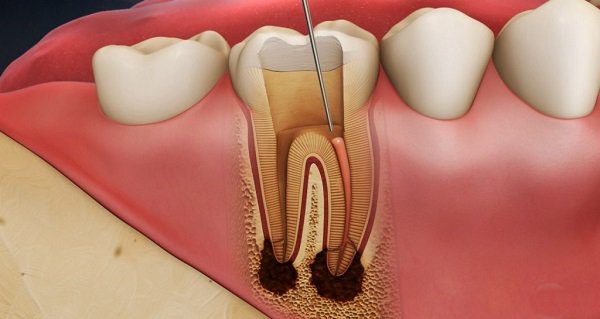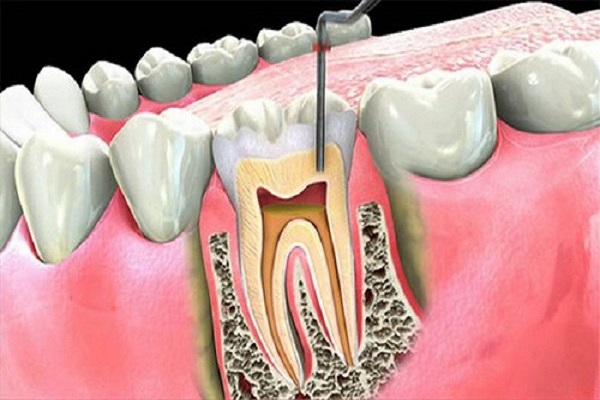Pulpitis is one of the most common oral health issues nowadays. When the dental pulp becomes inflamed, it not only causes pain but also leads to various dangerous complications that can impact overall health. So, what exactly is Pulpitis? What are the causes of inflamed dental pulp? And how is it treated? Champion Dental Clinic will reveal all the answers to these questions in this article. Stay tuned.
What is pulpitis?
Pulpitis refers to the inflammation of the dental pulp, which is the inner part of the tooth, as well as the surrounding tissues and nerves. It occurs when bacteria invade and damage the pulp, leading to inflammation. While pulpitis can potentially be reversible, prolonged cases of inflammation may result in serious complications that cannot be reversed.

Causes of pulpitis
There are several common causes of pulpitis, leading to inflammation and tooth pain. Here are four main causes that can contribute to pulp inflammation:
Regular consumption of tooth-damaging foods
Certain harmful foods can contribute to tooth decay and inflammation. Examples include sugary snacks, acidic fruits like lemons and oranges, and carbonated beverages. Excessive consumption of these foods can erode the tooth enamel, creating favorable conditions for bacterial invasion, tooth structure breakdown, and subsequent pulp inflammation.
Poor oral hygiene
Neglecting proper oral hygiene practices, such as inadequate brushing or improper technique, can also lead to pulpitis. Failure to brush after meals or not maintaining a consistent oral care routine can contribute to bacterial growth and inflammation in the dental pulp.
External trauma to the tooth
Teeth can become fractured, broken, or chipped due to significant impact or external trauma. When the tooth structure is compromised, the pulp can become exposed. This exposes the pulp to harmful bacteria, leading to inflammation and pulpitis.
Teeth grinding or clenching
Sleeping habits, such as teeth grinding or clenching, can also be an underlying cause of pulpitis that often goes unnoticed. Habitual grinding puts constant pressure on the teeth, gradually weakening them and making it easier for harmful bacteria to invade. This can ultimately result in pulp inflammation and tooth pain.

How to recognize pulpitis symptoms?
Symptoms of reversible pulpitis may include:
- Intermittent, throbbing tooth pain that worsens over time.
- Pain that lasts for a short duration, typically 5-10 minutes.
- Tooth sensitivity to hot, cold, or sweet stimuli.
Symptoms of irreversible pulpitis, which cannot be reversed, may include:
- Prolonged, lingering tooth pain lasting from minutes to hours.
- Initially triggered by hot or cold stimuli, followed by pain relief when exposed to cold.
- Increased intensity and duration of pain at night.
- Please note that accurate diagnosis and treatment should be sought from a dental professional.
Effective treatment methods for tooth pain caused by pulpitis
Below are some treatment methods that a dentist may perform:
For teeth with deep cavities that have recently reached the pulp without causing inflammation, the dentist will remove the decayed part, use specialized medication to cover the exposed pulp, and then fill the tooth. This treatment method aims to protect and restore the affected pulp.
In cases where pulpitis has already caused pain and discomfort, the dentist will take X-ray images to assess the condition, clean the inflamed pulp area using specialized instruments and irrigation solutions. Once the pulp has been thoroughly cleaned and the patient no longer experiences pain, the dentist will proceed to restore the tooth with a filling and may consider placing a dental crown on top. In severe cases of pulp inflammation or when the surrounding soft tissues are affected, tooth extraction may be considered if necessary.

Preventing Pulpitis - What You Can Do
You can take control of pulpitis and prevent its occurrence by following these measures:
- Avoid consuming extremely hot or cold foods.
- Brush your teeth after every meal.
- If you have a habit of grinding your teeth during sleep, consider using a mouthguard for protection.
- Limit the consumption of sugary foods, candies, carbonated drinks, and acidic beverages.
- Maintain regular dental check-ups every six months to allow the dentist to remove plaque, perform dental fillings before cavities worsen and become irreparable.
If you are experiencing symptoms of pulpitis, it is not recommended to self-treat at home. Instead, seek dental care to receive a professional diagnosis and appropriate treatment. Early intervention significantly reduces the risk of serious complications.
Champion Dental Clinic has treated numerous patients, especially those with pulpitis. Here, you will receive detailed consultations regarding your oral health condition, along with effective and advanced dental treatment solutions provided by our experienced dentists.
>> See more: When should children have baby teeth removed?
At Champion Dental Clinic, our philosophy revolves around maximum preservation of natural teeth. Therefore, you can trust us completely when choosing our services.
Moreover, we have a state-of-the-art facility equipped with modern equipment imported from countries such as the United States, Austria, Australia, and Taiwan. Our clinic is furnished with X-ray machines, CBCT scanners, dental chairs, and a closed sterile system. With these resources, Champion Dental Clinic ensures the utmost safety for our patients.
So, why hesitate? Visit Champion Dental Clinic today to achieve strong and healthy teeth, and a radiant smile. For more information, please contact our dedicated team of dentists and staff through our hotline, who are always ready to assist you.
Vietnamese & English: (028) 5411-2295
中文: (028) 5411-2297 172 Nguyen Luong Bang, Tan Phu Ward, District 7, Ho Chi Minh City.
Fanpage: Champion Dental Clinic 牙科診所
Zalo: Champion Dental Clinic
Youtube: Champion Dental Clinic 牙科診所
 Champion Dental Clinic
Champion Dental Clinic



